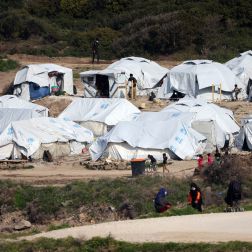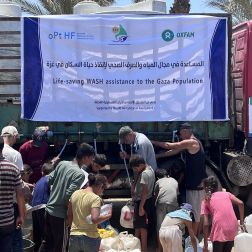- 4 mins read time
- Published: 10th December 2020
COVID-19 and hunger, a lethal threat facing the people of Yemen this winter
The pandemic has turned some of us into armchair statisticians. Those of us who, every evening, frantically check Twitter or turn on the news to hear the infection rates – and on the bad days, the number of fatalities. We monitor the rise in cases across the world, obsess over spikes and waves, and wish it would all end so life would go back to normal.
But for the people of Yemen, life was far from normal even before COVID-19. For more than five years, the country has been in the grip of war and the world’s worst humanitarian crisis.
Four out of every five Yemenis need some kind of humanitarian assistance, and almost four million people have been displaced by the fighting and airstrikes. Almost 20 million, or two thirds of the population, have to rely on food aid to survive, while Yemen is also experiencing the largest cholera outbreak on record. Now families in Yemen face another threat – COVID-19.

And that’s not all. Widespread destruction of the country’s health services and water infrastructure mean that the people of Yemen are at serious risk if they contract the virus. Yet the United Nations’ response plan to get clean water, food and medical care to the most vulnerable is only 44 percent funded this year.
It is a tragedy of epic proportions, made worse by the fact that other members of the G20 have exported more than US$17billion worth of arms to Saudi Arabia since it became involved in the conflict in Yemen in 2015. Those same members have only given a third of that amount in aid to people caught up in the crisis.
“Having suffered years of death, displacement and disease, the people of Yemen need these powerful members of the international community to bring all parties to the conflict together to agree to an immediate countrywide ceasefire and return to negotiations committed to achieving a lasting peace. Making billions from arms exports which fuel the conflict while providing a small fraction of that in aid to Yemen is both immoral and incoherent. The world’s wealthiest nations cannot continue to put profits above the Yemeni people.”— Muhsin Siddiquey, Oxfam’s Yemen Country Director

Among those affected by the war is Ibtisam Sageer Al Razehi, a 35-year-old former teacher and mother of three. She lives with her young children in the remains of the family house in Sa’ada city which was damaged by missiles and artillery fire. Her husband was killed by an airstrike in 2015.
“I lost my husband, my children lost their father, we lost the breadwinner and because of war I also lost my salary as our last hope for living. Humanitarian aid has decreased a lot; now we receive food every two months instead of every month. I appeal to the world to have mercy on the children of Yemen and stop this war. We are very tired of living in war for years, we lost everything beautiful in our lives, even the simple hope of peace."— Ibtisam
The people of Yemen have already suffered so much. Without your help, many of them risk starving this winter or, weakened by hunger, could succumb to COVID-19.




